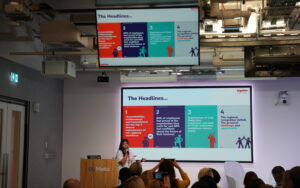The modern workplace is a melting pot of generations, each with its own values, motivations, and expectations. Understanding these differences isn’t just important—it’s transformative. A strong workplace culture thrives when all employees feel seen, respected, and empowered to contribute their best. In the Middle East, where the workforce blends deep-rooted traditions with global influences, appreciating generational dynamics is key to creating harmony and driving innovation. By embracing these nuances, organisations can build cultures that are not only inclusive but also uniquely reflective of the region’s evolving identity.
Understanding the Generational Divide in Company Culture
Baby Boomers and Gen Z professionals bring distinct perspectives to the workplace, which directly impact company culture. For Baby Boomers, workplace culture is rooted in meritocracy and loyalty. Sarah ElAshmawy, Culture Consultant at together, explains, “For Baby Boomers, workplace culture is rooted in meritocracy and loyalty. Their core value is commitment, reflected in their pride in working ‘for’ a company and ‘serving’ the business.” This approach fosters a culture of stability and dedication.
Gen Z, on the other hand, has grown up during economic crises and rapid technological advancements, shaping their workplace attitudes. Sarah ElAshmawy elaborates, “Gen Z, on the other hand, has grown up during economic crises and rapid technological advancements, shaping their workplace attitudes. They value ‘working with’ a company and ‘contributing’ to its success. Balance is central to their approach, as they prioritise boundaries and personal needs, redefining what a healthy workplace culture looks like.”
In the Middle East, these generational differences are particularly pronounced, given the region’s rapid economic development and evolving workplace expectations. Understanding and addressing these dynamics is crucial for companies striving to build strong, inclusive workplace cultures.
Challenges in Creating Inclusive Cultures
The differing values of Baby Boomers and Gen Z can create cultural tension within organisations. Baby Boomer leaders may perceive Gen Z’s emphasis on balance and boundaries as a lack of commitment, leading to management styles that pressure younger employees to “prove” their dedication. This can result in misaligned expectations and disengagement.
In the Middle East, where traditional values often intersect with global business practices, these challenges are magnified. Companies must navigate a complex cultural landscape to foster a culture that bridges generational gaps and reflects regional values. Sarah emphasises that “understanding and addressing these dynamics is crucial for companies striving to build strong, inclusive workplace cultures.”
The Role of Regional Identity in Workplace Culture
Gen Z professionals in the Middle East bring a unique blend of global exposure and regional pride to the workplace. Unlike previous generations, they are less likely to carry traditional values into their professional lives. However, they are deeply committed to authentically representing the region and incorporating its identity into global workplace practices. This ambition creates opportunities to build a culture that is both innovative and rooted in the region’s heritage. Sarah notes, “For Baby Boomers in the region, their role as legacy holders and mentors can serve as a cultural anchor, creating a sense of continuity while embracing the fresh perspectives of Gen Z.”
For Baby Boomers in the region, their role as legacy holders and mentors can serve as a cultural anchor. By leveraging their experience and wisdom, organisations can create a sense of continuity while embracing the fresh perspectives of Gen Z.
Strategies for Building Strong Workplace Cultures in the Middle East
- Define and Communicate Organisational Values: A clear vision, mission, and set of values are essential for aligning diverse generational perspectives. In the Middle East, these values should reflect regional identity while embracing global best practices. For example, values like innovation, collaboration, and respect can be tailored to the cultural nuances of the region.
- Foster Dialogue and Collaboration: Programmes such as multigenerational coaching circles, reverse mentoring, and skills exchange initiatives can help bridge gaps and build trust. These initiatives are particularly impactful in the Middle East, where cross-generational respect and mentorship are highly valued.
- Embrace Flexibility and Balance: Incorporating Gen Z’s emphasis on balance into workplace policies can enhance employee engagement and well-being. For example, flexible working arrangements and transparent career progression pathways can create a culture that appeals to both generations.
- Celebrate Regional Identity: Highlighting the unique aspects of Middle Eastern culture in workplace practices can foster a sense of pride and belonging. For instance, integrating regional traditions into team-building activities or recognising local holidays can strengthen cultural connections within the organisation.
In summary
In the Middle East, workplace culture is at a crossroads, shaped by the interplay of traditional values and modern expectations. By focusing on what unites generations and leveraging the region’s unique cultural strengths, organisations can create dynamic, resilient cultures that drive performance and innovation.




